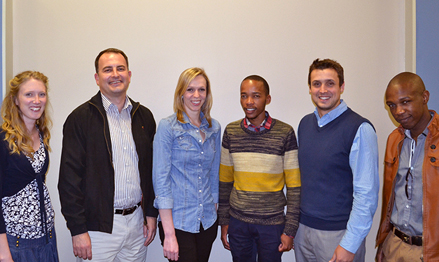Latest News Archive
Please select Category, Year, and then Month to display items
23 November 2022
|
Story André Damons
![]()
Prof Motlalepula Matsabisa, Professor and Director of Pharmacology, will play host to the various stakeholders to network and share knowledge on current developments in indigenous knowledge research and product development, biodiversity, innovation, and commercialisation of the IK-based research products. The Indigenous Knowledge System (IKS) for Health unit in the Department of Pharmacology within the UFS Faculty of Health Sciences was last year awarded an annual Technology Innovation Agency Platform (TIA) grant of R17 million for the next five years.
The research and teaching programme in the School of Clinical Medicine has since been rebranded and is now known as the African Medicines Innovation and Technology Development Platform (AMITD), which will strive to respond to community health needs and address industry research needs and challenges.
The indaba will showcase progress made by TIA and other entities in enriching the development and commercialisation of IK-based innovations. It will take place from 24 to 25 November 2022 in the Equitas Senate Hall at the UFS.
Prof Matsabisa is the chairperson of the World Health Organisation’s (WHO) Regional Expert Advisory Committee on Traditional Medicines for COVID-19. He is also a visiting professor at the Beijing University of Chinese Medicine (BUCM) in Beijing, China, and the Deputy President of the South African Society for Basic and Clinical Pharmacology.

UFS gets support for improving university access and success in South Africa
2013-10-24
|
 |
|
Members of the SASSE Research team are from left: Carike Jordaan, Dr Francois Strydom, Lana Swart, Seisho Gaboutlwelweboutlwelwakemo, Michael Henn en Katleho Nyaile.
Photo: Supplied
24 October 2013 |
The university’s Centre of Teaching and Learning (CTL) received a grant for US$820 000 (about R8 million) from the Kresge Foundation for their South African Survey of Student Engagement (SASSE) research team.
The SASSE research team is committed to furthering student access with success by promoting quality teaching and learning institutionally and promoting collective impact around student success nationally.
Through this three-year project, the SASSE team aims to provide a range of deeply contextualised and globally benchmarked student engagement measures that can be used at institutional and module/course level for the South African context. The data from these measures can be used to improve the quality of undergraduate teaching and learning, and participating institutions will have access to appropriate capacity development interventions to empower them to use the data to promote evidence-based change in their institutions.
Dr Francois Strydom, Academic Director at the CTL, says the lessons from this higher-education project could be used to develop a stronger post-school sector which could help the country to deal with the massive challenge of youth unemployment; thereby promoting equity, social justice and a prosperous democracy in South Africa.
The Kresge Foundation is a private philanthropic foundation in the United States, which is focused on creating opportunity for low-income people through various programmes. This three-year project forms part of the Kresge Foundation’s Education Programme, which focuses on promoting access and success at South African universities. Therefore the SASSE project aims to contribute to the Kresge-sponsored Access and Success in Higher Education in South Africa (ASHESA), to promote a national conversation on improving student success.
In January this year, the university was one of four South African universities selected to take part in a multi-million rand programme to bolster private fund-raising and advancement efforts. For this programme the UFS was granted US$640 000 (about R5,6 million) over a period of five years.